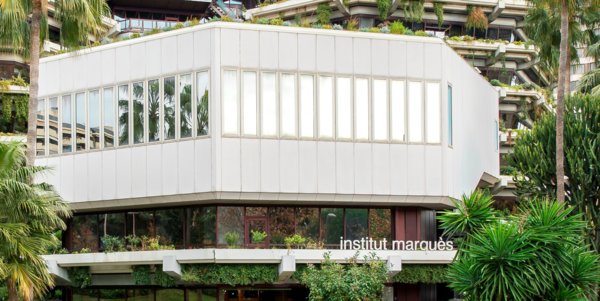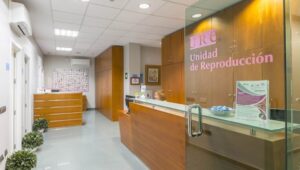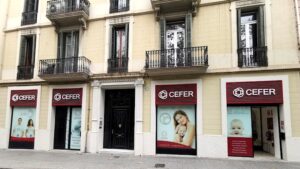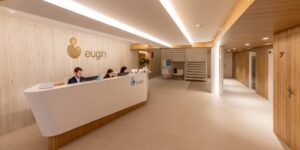IVF treatment availability at Institut Marquès
| IVF at Institut Marquès - restrictions | |
|---|---|
| Woman maximum age | 51 |
| Single woman | Allowed |
| Same sex female couples | Allowed |
| HIV (female) | Allowed |
| HIV (male) | Allowed |
| HCV / HBV (female) | Allowed |
| HCV / HBV (male) | Allowed |
About Institut Marquès
Institut Marquès was founded all the way back in 1922 and has been open ever since, which is an amazing length of time. With its main clinic in Barcelona, it has also opened offices/clinics in London, Sabadell, Milan, Rome, and Kuwait. The history of the clinic is remarkable in that it was founded in 1922 by Dr. Vicens Marquès i Bertran; whilst currently working at the clinic is Dr. Borja Marquès, who is a fourth-generation of gynecologists from the Marquès family, meaning that since founded, at least one member of every generation of the family has worked there.
When you first visit the clinic you will be in awe of the architecture on show for the clinic, and behind the clinic, as the buildings are all shaped like hexagons, and have beautiful plant life and trees all on show, making you feel like you are in a tropical paradise. Once inside the clinic you will notice light colours everywhere, from the white walls, to the light green furniture, as well as the lightly coloured wooden floors and furniture. Light colours have been proven to evoke a sense of calm and well-being in a person, and can also make you feel comfortable and at home.
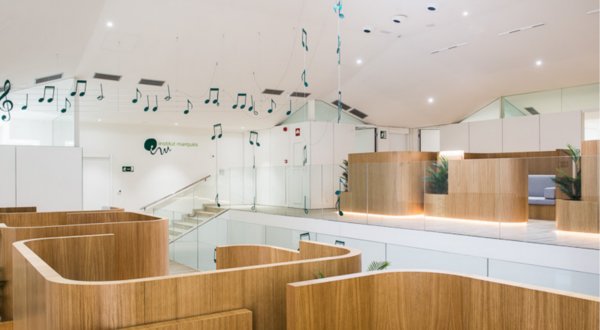
Music at Institut Marquès
One more thing you will notice is the musical notes that adorn the walls and hang from the ceiling. Music is a fundamental part of their identity. In their in vitro fertilisation laboratory, they have hosted concerts featuring renowned artists such as Antonio Orozco, Álex Ubago, Sharon Corr, and Hugo Marlo. At Institut Marquès, they strongly believe in the positive impact of music on the patients’ experience during Assisted Reproduction treatments. That’s why music plays a unique and meaningful role in the clinic.
The Role of Music in In Vitro Fertilisation
Emotional well-being is essential in Assisted Reproduction treatments. Music profoundly influences mood, and for Marques team, it serves as a source of support for their patients throughout their journey. At Institut Marquès, they have conducted extensive research on the effects of music in ART (Assisted Reproductive Technology), further reinforcing its importance in such approach.
It’s not just music that Institut Marquès offers to help with development, as they also offer services to the would-be parents who are undergoing treatment with them. One such offering is special waiting areas called “nests” which you can reserve by the hour before and after your treatment and which ensure your privacy. They also offer both a massage and acupuncture to help you relax before and after:
- Massage. You can either undergo a massage before or after your egg retrieval or embryo transfer, in order to help your mind and body relax.
- Acupuncture. After your IVF procedure, you may feel some discomfort or stress. Acupuncture can be the perfect cure for all of that as it is the perfect way to help you relax.
The goals of the team at the clinic are to give you the best chances of success when it comes to infertility treatment, so they always ensure they have access to the latest technologies and treatment methods. One of the methods that they like to utilise is called EmbryoMobile. What this does is it connects your phone to the embryoscope, which is the time lapse monitoring system that monitors the embryos.
A study conducted by SIFES (Italian Society for Fertility, Sterility and Reproduction Medicine), and the SFR (French Reproduction Society), showed that patients saw an 11% increase in pregnancy rates when they were able to see the embryos during the development process. Even more impressive is that there was a direct correlation between pregnancy success and a higher watch time of the embryos by the would-be parents. Not only was it proven to achieve a more successful pregnancy rate but the emotional bonding felt by the parents was higher too, proving that this system works very well.
It is not just women with husbands or partners, or single women, who want to be parents, as many members of the LGBTQ community also want to see their dreams of parenthood come to fruition. Because of this they came up with the Rainbow Fertility Barcelona project, designed to help LGBTQ people achieve their dreams. What’s more, if you belong to an LGTBI+ (LGBTQ) association, you will receive a 10% discount on your treatment. The clinic even has their own Premium Sperm Bank, with over 2,000 egg and sperm donors, so that they are able to match you with your donor as closely as possible, but don’t worry, all donors undergo strict testing to ensure healthy eggs and sperm.
Institut Marquès believes in offering the very best treatment, as well as the best quality of care towards their patients, as well as the eggs, sperm and embryos that are under their care. Due to this it should come as no surprise that they have been on the receiving end of multiple awards over the years. One such award was at the Global Game Changers Awards, which are all about recognising the excellence, innovation, and achievements of organisations and professionals all over the world.
At their 2021 awards the clinic was awarded the award for Best Medical Practice Operator of the Year. Now when you consider how many medical practices there are all over the world, this is truly an outstanding award to receive, and should fill you with the utmost confidence when undergoing treatment at the clinic.
As well as the above awards the clinic holds multiple certificates that showcase their commitment to excellence in quality care and quality control. In order to obtain these prestigious certificates they must show continuous improvement in treating their patients, as well as improving their processes and techniques. These certificates are ISO 9001 and UNE-179007.
Experience and Medical Staff at Institut Marquès
Institut Marquès works with 21 experienced doctors (excluding the Medical Director) and 13 embryologists (11 in Barcelona and 2 in Rome). They have 5 senior embryologists who have between 8 and 15 years of experience in IVF. Two of the clinic’s embryologists are ESHRE accredited. Patients are supported by an international team made of 20 Patient Assistants and Medical Assistants. The staff speaks English fluently so you will not have problems with communication.
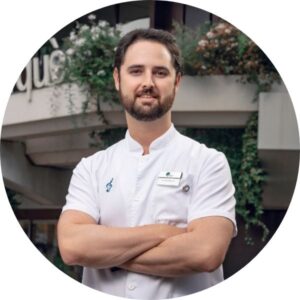
The fourth generation of gynaecologists in the Marquès family, Dr. Borja Marquès López-Teijón currently combines his practice as a gynaecologist specialising in Assisted Reproduction with the Medical Management of Institut Marquès. Trained at the Hospital Clínic in Barcelona, he obtained his degree in Medicine in 2014 and worked as an Internal Medical Resident at the same hospital until 2019. He currently sees national and international patients from the Institut Marquès centre in Barcelona (Spain). Member of the ESHRE, the SEF and the SEGO, Dr. Borja Marquès has specialised in cases of infertility with special difficulties.
On a scientific level, he participates in the most important international congresses and medical meetings in the field of Assisted Reproduction, presenting numerous studies and papers that have been published in the scientific journals of the speciality. One of his latest works, “Signs of Embryo Self-Repair Potential in the in Vitro Fertilisation Laboratory”, was awarded a prize at the last congress of the Spanish Society of Gynaecology and Obstetrics (SEGO) in its latest edition.
Dr. Borja Marquès López-Teijón has also contributed as a lecturer at the University of Barcelona – Hospital Clínic de Barcelona, with a keen interest in technology and research. His goals as Medical Director of Institut Marquès prioritise patient care and the personalisation of diagnoses and treatments. His patients highlight his honesty, closeness, and professionalism.

Dr. Àlex García-Faura, a seasoned professional with 25 years of experience, currently serves as the Scientific Director at the clinic, specializing in Obstetrics, Gynaecology, and Reproductive Medicine. In his role, he oversees clinical trials and conducts studies exploring the impact of music on IVF and pregnancy.
Since 2001, Dr. García-Faura has held the position of head of the Oncology and Reproductive Medicine Unit at Institut Marquès. In this capacity, he provides support to patients who have undergone oncological treatment and have aspirations for pursuing IVF treatment post-cancer to fulfill their dreams of starting a family.
The rest of the medical team includes Dr Victoria Walker and Dr Rosa Trigas who mainly see English-speaking patients, but, also, Dr Hans Arce, Fertility Expert and Medical Director of Future Life Western Europe (ART provider), along with Dr David Peet, and Dr Kristina Portela, all experienced assisted reproduction specialists.
The clinic also has a lot of other staff members, which includes 21 doctors and 13 embryologists, who are all highly qualified and experienced. Owing to the fact that they treat patients from all over the world, they have patient assistants who speak multiple languages and have international programmes that have been designed to help international patients. When being treated at the clinic you can be sure that you will be able to communicate with the staff in one of the following languages:
- Spanish
- Catalan
- English
- Italian
- French
- German
- Dutch
- Portuguese
- Arabic.
This way you will feel safe in the knowledge that you will always understand, and always be understood, at every step of your journey.
Dr. Victoria Walker, who works closely with English-speaking patients, also shares her expertise in the “Fertility Webinars” session, “Mosaicism and Implantation: Do Mosaic Embryos Really Have a Chance?” (YouTube video below). In this session, she explains what mosaic embryos are, how they’re detected, and what they mean for IVF, offering clear guidance based on the latest research and clinical experience.
IVF Costs at Institut Marquès
| Basic IVF packages cost at Institut Marquès | |
|---|---|
| Intrauterine insemination (IUI) | €1,170 |
| Artificial insemination with donor (AID) | €1,570 |
| IVF with own eggs | €5,250 |
| Egg donation IVF | €5,290-€7,090 |
| Embryo donation | €4,300 |
| Egg freezing | €2,695 |
| Sperm donation | from €5,600 (5,250 IVF with own eggs + donor sperm €350) |
| ROPA | €6,050 |
| Surrogacy | N/A |
When it comes to your treatment at Institut Marquès, you will expect to pay 1,170 Euros for IUI (intrauterine insemination), and 1,570 Euros for AID (artificial insemination with donor), 3,710 Euros for a natural IVF cycle, 5,250 Euros for IVF, with egg donation starting from 5,290 Euros.
If you require embryo donation/adoption then the cost is 4,300 Euros. ROPA treatment, which is for lesbian couples, will cost 6,050 Euros, although you can receive a 10% discount if you are a member of an LGBTI (LGBTQ) association.
Donor sperm starts from 350 Euros. If you wish to have any sperm frozen, for future purposes, you will be paying 325 Euros. Additional services are available as well, with embryo monitoring costing 480 Euros, blastocyst culture costing 600 Euros. Patients interested in PGT-A embryo testing may want to look at these costs:
- Embryo Biopsy for PGT – €1,250.
- Patients with 1 to 5 embryos need to pay €350 per embryo tested.
- Patients with 6-8 embryos need to pay €3,200 for all embryos tested.
If you wish to freeze the remaining embryos, that were not used in your treatment and store them you can also do that. Vitrification of remaining embryos and storage for 1 year will cost you 875 Euros and, then, if you are planning to have them used during FET (Frozen Embryo Transfer) – the cost is 2,750 Euros from transferring the thawed embryos.
The clinic also has premium packages available, which come with a whole host of benefits that include:
- An assistant who will help you organise your stay and travel, as well as recommendations on places to visit.
- A private VIP box with no time limit.
- Priority, so that you will have no waiting times when in the clinic and will always be seen once you are ready.
- Purchasing of medicine on your behalf, and many more benefits.
IVF add-ons and other costs
| Other IVF techniques costs at Institut Marquès | |
|---|---|
| Medical consultation (doctor) | free |
| Donor sperm | from €350 |
| Sperm freezing | €245 |
| Embryo Monitoring (e.g. Embryoscope) | €480 |
| Blastocyst culture | €600 |
| PGT-A / PGS genetic embryo testing | Patients with 6-8 embryos: Fixed total cost of €3,200 (including biopsy). Patients with 1-5 embryos: €350 per embryo plus an additional €1,250 for the biopsy. |
| Embryo freezing and storage for 1 year | €875 |
| FET - Frozen Embryo Transfer | €2,750 |
IVF Refund Guarantee Package with Donor Eggs
The Premium Pregnancy Guarantee Insurance (IVF Refunding Programme) at Institut Marquès offers a money-back guarantee for €25,100. This package includes three complete IVF cycles using donor eggs. If the program does not result in a live birth, a 70% refund is provided. Qualification for the program is required. For more details, please contact the clinic.
Refund Package (Money back guarantee):
Refund is guaranteed if the program does not end with the desired result.
IVF Success Rates at Institut Marquès
Every year the clinic performs an average of 1,500 IVF cycles using the patient’s own eggs, and an average of 1,500 IVF cycles when using donor eggs. When comparing the success rates of Institut Marquès with other IVF clinics around Europe, you’ll find that they have above-average success rates. For the year 2022, the overall success rate for a clinical pregnancy using donor eggs per embryo transfer was 87.2% and 91.5% for double donation (donor eggs + donor sperm).
When using the patient’s own eggs, the overall success rate for clinical pregnancy per embryo transfer was 72.4%. When broken down into age groups the success rates were:
- women under 35 – 76.6% (with partner’s sperm), 84.7% (with donor sperm),
- women aged 35-39 – 62.3% (with partner’s sperm), 73.7% (with donor sperm),
- women over 40 – 27.7% (with partner’s sperm), 26.6% (with donor sperm).
In 2022, the frozen embryo clinical pregnancy success rate per embryo transfer was 56.5%. And the embryo donation clinical pregnancy success rate was 57.1%. Institut Marquès’ success rates are accredited by the FIV-CAT, a body that depends on the Generalitat de Catalunya – a competent authority in Health matters – to which all clinics performing IVF in this region must report. Furthermore, the centre participates in the registry of the Spanish Fertility Society (SEF).
The multiple birth rate at the clinic in 2022 was 3.2% for donor eggs. If we look at patients’ age the multiple birth rate fro donor eggs looks as follows:
- women under 35 – 4% (with partner’s sperm), 4.2% (with donor sperm),
- women 35-39 years old – 4.1% (with partner’s sperm), 4% (with donor sperm),
- women over 40 – 0% (with partner and donor sperm) so this means that there were no twin pregnancies for these patients.
The multiple birth rate for frozen embryo transfers was 2.9% and for embryo donation transfers 2.4%.
In 2022, the doctors at Institut Marquès transferred on average 1.1 embryos.
As you can see, the clinic achieves excellent success rates, which should fill you with confidence that, when undergoing treatment with them, you will be satisfied.
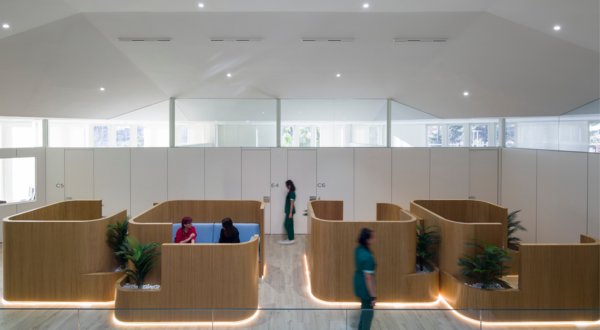
Institut Marquès – Location
The main clinic for Institut Marquès is located in Barcelona, a beautiful coastal city in Spain. With architecture to marvel at and plenty of things to see and do, including 9 beaches for you to walk and relax on while staring at the Mediterranean Sea.
Located only 2 km from the city centre and about 40 minutes drive from the airport, you will have easy access to whichever parts of the city you want to go to, during your treatment. It is truly the perfect place to go. And with it being so large it will have plenty of hotels for you to choose from if you decide to choose the Hilton Barcelona Hotel, you will even receive a 10% discount, thanks to the clinic.
